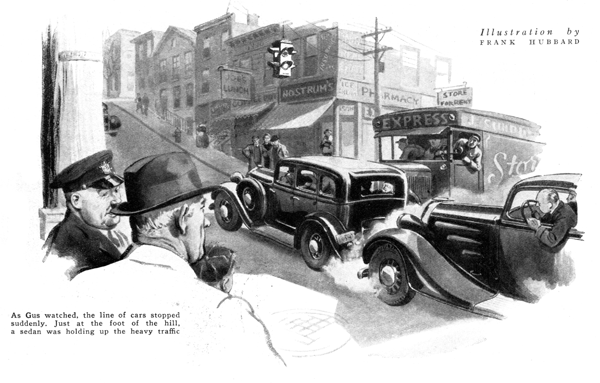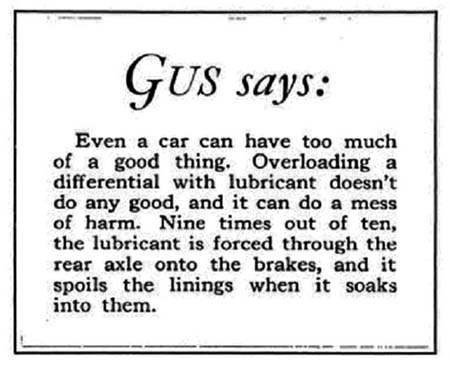April 1935
CHECK UP ON YOUR CLUTCH

Waiting on the curb for the light Gus Wilson watched the long line of cars start their climb up the steep Center Street hill. It was the usual Sunday afternoon traffic jam.
Suddenly, the line stopped. A sedan, just at the foot of the hill, was having trouble. Horns tooted, gears growled, and men shouted. In spite of the plume of smoke that puffed rhythmically from its exhaust pipe, the car could not budge. At last, with a clanking and scraping of bumpers, the car behind pushed it around the corner and out of the way.
Gus shouldered his way through the small crowd that had gathered around the stalled car and spoke to the driver.
"My name's Gus Wilson," he said. "I run a garage and I thought maybe I could give you a hand. What's your trouble?"
"Blamed if I know," the man replied, fiddling nervously with the gearshift lever. "Everything was all right until I started up that hill. When the light changed, I put her in low, let out the clutch, and stepped on the gas. She went ahead for a few feet, then the motor started racing and she stopped."
"Mind if I try?" asked Gus. "You're on level ground now, and she may act better."
Gus edged into the driver's seat and stepped on the gas. "Sounds swell!" he commented, as the motor raced. "The gear shift seems to work all right too."
The veteran mechanic shifted into low and cautiously let out the clutch pedal. At first, nothing happened, but as he fed the motor more and more gas, the car moved unsteadily ahead like a snail.
"I'm sorry, mister," Gus said, shaking his head, "but your clutch is shot. It's slipping so badly it won't drive the wheels."
"The clutch!" echoed the man. "Gosh, now I am in a pickle! Something like this would have to happen, when I'm sixty miles from home!"
Gus pulled his watch from his pocket. "It's just two o'clock now. Why not let me coax the car over to the Model Garage. If we work fast, and have any luck, we ought to be able to fix the car up by five."
Once Gus had donned his overalls and cap, he wasted no time. In less than three quarters of an hour he dropped the transmission, loosened the clutch cover, and had the main clutch assembly out on his workbench.
"So that's what a clutch look like," exclaimed the car owner. "Sort of a combination of springs and plates isn't it?"
"That's right, and it's those springs and plates that hook up your motor with the main drive shaft when you let out the pedal. This particular clutch is what is called a single dry-plate type. See this?"
Gus held up a thin metal disk about ten inches in diameter; on each side it had a flat ring of hard, fabric like material.
"That's the clutch disk. It's fastened to the shaft that drives your transmission, and rides between the inside of the flywheel and a heavy plate attached to these springs. When your clutch pedal is out, the springs force the pressure plate toward the flywheel, clamping the clutch disk in between. Naturally, it binds against the flywheel and turns each time the flywheel is turned by the motor.
"Now," continued Gus, stopping for a breath, "when you push your clutch pedal down, the springs are compressed, the pressure plate is moved away from the flywheel, and the clutch disk is free."
"But what's this stuff for?" interrupted the car owner, pointing to the ring of fabric on one side of the disk. "Looks like brake lining."
"And it is something like brake lining," agreed Gus. "That's the friction surface that makes contact with the flywheel and the pressure plate when the clutch pedal is all the way out. And, incidentally, it's the one thing that wears in a clutch and causes trouble.
"Take your case for instance. Your motor ran swell, but it wouldn't drive the rear wheels on a hill. Why? Look at these friction surfaces. They're worn down smooth, and are only about half as thick as they should be. Of course, it wouldn't bind between the pressure plate and the flywheel. It slipped; it couldn't take hold.
"Have you ever driven a car that wouldn't start up without almost jerking your head loose? That's because the clutch takes hold too suddenly. The adjustment may be too tight, the clutch surfaces may be glazed over, or the rivets that hold them in place may be sticking out so that they grab."
"Gosh, isn't there some way to take up for the wear in a clutch without taking it all apart?" asked the car owner as he gazed at the assortment of parts on the bench.
"Sure. On most clutches you can adjust the pedal to make up for normal wear and tear, but your clutch is beyond that. The only thing left now is to put on new friction rings.
"Clutches are funny things. The more they slip, the more they wear. From the looks of yours, it's been slipping a long time. If you'd had it adjusted four or five months ago, this might not have happened."
"But how in the world would I know it wasn't working right?"
Gus shrugged his shoulders. "You can't tell how much air is in a tire by looking at it, but you can have it checked at your garage, now and then. Besides, if you know where to look for them, you can find plenty of symptoms of a slipping clutch.
"It generally shows up first in starting; the motor will race, but the car won't move ahead very fast. Then, sometimes, on hills, the engine will suddenly speed up without making the car go any faster.
"You can tell a lot, too, by the feel of the clutch pedal. If you find it doesn't take hold 'til it's almost all the way out, it's usually a sign something's wrong.
"Noises are another warning. When a clutch chatters, chances are the pressure plate is warped or one of the springs is weakening. A squeaking clutch, generally, comes from lack of oil in the throw out bearing, and a rattle means one of the moving parts is loose or a spring is broken.
"Of course," confirmed Gus, working as he talked. "A slipping clutch doesn't always mean wear or broken parts. Sometimes oil or grease gets on the clutch facings and makes it slip. When that happens, the best cure is a gasoline bath. Turn the motor over slowly and squirt the gas over the disk with a grease gun or an old garden spray."
"But I thought some clutches were supposed to run in oil."
"Some are, but the majority of modern cars use clutches which have to be dry, to work. Except for a few that have more than one friction disk, most clutches are just like yours."
"Gosh!" The car owner wagged his head. "This clutch business is all news to me. I never gave it a thought until today."
"And that's where most of the trouble comes in," pointed out Gus. "A clutch, to most drivers, is just something you have to fool with every time you shift gears. Most clutch troubles don't come from normal wear; they come from abuse."
"By the way," the man said when Gus announced that the job was finished, "you haven't tipped me off to any tricks I can use to save my clutch."
"Forget about the tricks, and use a little common sense," advised Gus. "Just keep your foot off the clutch pedal as much as possible. Don't give the car too much gas when you're starting up. Don't slip the clutch to hold your car when you're stopped on a hill. And let your serviceman look at the clutch now and then. If a slipping clutch is caught in time, it can be adjusted in a jiffy."
END
L. Osbone 2019
